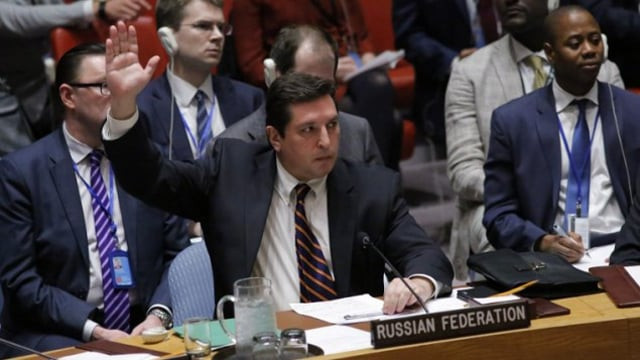Russia vetoes UN draft resolution on Syria gas attack probe
France and Britain expressed its dismay over the Russian veto

Russian Deputy Permanent Representative to the United Nations Vladimir Safronkov holds up his hand as he votes against a draft resolution that condemned the reported use of chemical weapons in Syria during a meeting at the UN Headquarters in New York, April 12, 2017. PHOTO: AFP
Britain, France and the United States had put forward the measure in response to the suspected sarin gas attack in rebel-held Khan Sheikhun on April 4 that left 87 dead, including 31 children.
Russian TV says US missile strikes on Syria destroyed nine planes
The Russian veto came after US Secretary of State Rex Tillerson said after talks in Moscow that there was a "low level of trust" between the United States and Russia.
China, another veto-holding power at the council, abstained in the vote, as did Kazakhstan and Ethiopia. Bolivia voted against the measure and 10 other council members supported it.
Addressing the council, Russian Deputy Ambassador Vladimir Safronkov said the draft measure was "doomed" from the start.
"The outcome was pre-determined because we have consistently expressed our categorical disagreement with the content of the document," he told the council.
The proposed resolution would have condemned the alleged attack and expressed the council's full backing to investigators from the Organization for the Prohibition of Chemical Weapons (OPCW).
The draft would have demanded that the Syrian government provide flight plans, flight logs and other information on its military operations on April 4, hand over the names of commanders of any aircraft and provide access to air bases to UN investigators.
The West has accused Assad's forces of carrying out the attack in Idlib province that shocked the world. Safronkov said ahead of the vote that Russia had proposed to the United States that a joint request be sent to the OPCW to send a fact-finding team to Khan Sheikhun and the Shayrat air base, which the United States maintains was used to launch the chemical attacks.
He said the OPCW executive council will meet in The Hague on Thursday to consider the suspected attack and that "putting draft to a vote today does not serve a useful purpose".
France and Britain expressed its dismay over the Russian veto.
"This puts Russia on the wrong side of the argument," British Foreign Secretary Boris Johnson said in a statement in London.
In Paris, French President Francois Hollande said in a statement: "Russia bears a heavy responsibility" by systematically opposing multilateral action to protect its Syrian ally Assad.
UN investigators already have the mandate under previous resolutions to look into allegations of chemical weapons use in Syria but the West had pushed for council resolution to underscore its support for a thorough investigation in the Khan Sheikhun case.
Syria is obliged to cooperate with the OPCW as a member of the Chemical Weapons Convention, which it joined in 2013, but access to sites has been a complicated issue.
Russian Foreign Minister Sergei Lavrov said in Moscow following his talks with Tillerson that the OPCW should be allowed to carry out its work in an impartial manner.
US strikes in Syria ‘aggression against sovereign state’: Russia
"We insist on an objective investigation of what happened on the 4th of April," said Lavrov.
Russia separately presented a separate draft text condemning the US military strikes in Syria and requesting an OPCW investigation. It was unclear when that proposed resolution would come up for a vote.
British Ambassador Matthew Rycroft told the council earlier that tests performed by British scientists on samples from Khan Sheikhun had shown that sarin or a sarin-like substance had been used.



















COMMENTS
Comments are moderated and generally will be posted if they are on-topic and not abusive.
For more information, please see our Comments FAQ